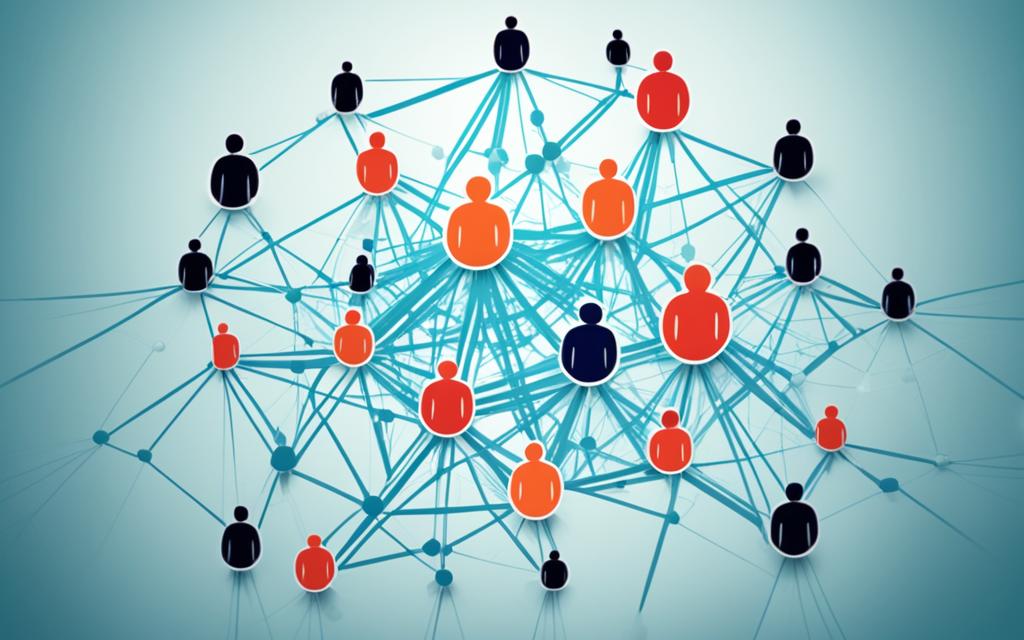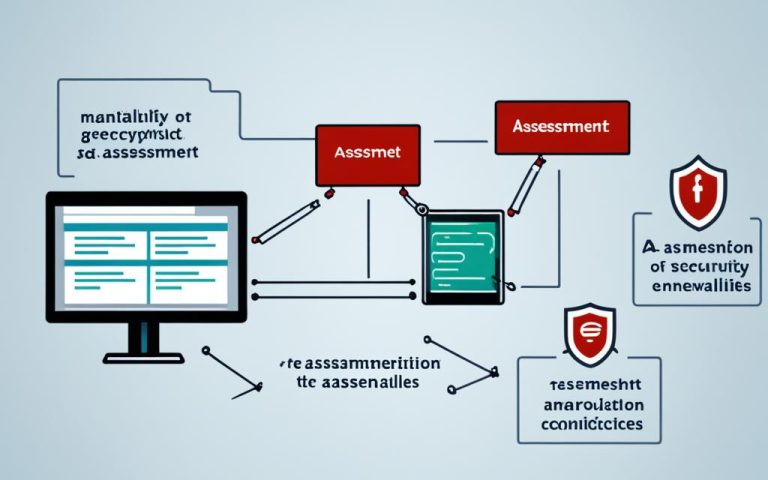Networking is key for growing in your career. It helps you make connections, work with others, and find new chances. But, in the business world, it’s important to know where to draw the line. This line separates good networking from bad practices like nepotism and cronyism.
Nepotism means giving favors to family members. Cronyism is about helping out old friends. These actions can go beyond just making professional connections. They often leave out qualified people, hurting companies and their teams.
Studies show that nepotism and cronyism can make companies less productive1. They can also make employees less motivated1. This can lower the skill level of everyone in the company1.
When nepotism gives unfair advantages, talented people might look for better opportunities elsewhere1. Managers who are close to those who practice nepotism might find it hard to treat their team fairly1. This can mess up the company’s structure and make people feel unequal1.
Nepotism and cronyism can make people feel they deserve special treatment just because of who they know. This can make others unhappy if they’re not getting the promotions or chances they want1. It can also make the work life of those connected to these practices stressful1.
Networking is important for growing in your career, but it’s important to know the difference between good and bad networking. By focusing on fairness, giving everyone a fair chance, and valuing each person’s skills, companies can create a place where everyone feels included and respected.
Key Takeaways:
- Nepotism and cronyism in the workplace can decrease overall productivity and impact employee performance1.
- Talented employees may seek fair opportunities elsewhere due to unfair advantages provided through nepotism1.
- Managers connected to individuals practicing nepotism may struggle with fair treatment of subordinates1.
- Nepotism and cronyism can create a sense of entitlement and stress among connected employees1.
- Fostering fairness, meritocracy, and individual skills enhances workplace integrity and inclusivity.
Understanding Nepotism in the Workplace
Nepotism is when people in power give favors to their friends or family at work. This means they often pick them for jobs, promotions, or special treatment over others. It’s not about who is best for the job, but who they know.
Studies show how common nepotism is in different jobs and countries. For example, in finance, knowing people is more important than what you know2. This is especially true in the United States, where networking is key to getting ahead2.
But, the U.S. also has issues with social mobility, showing how nepotism can hold people back2. In France, your school can greatly affect your career, especially in banking2. In the U.K. and Europe, class and elitism also play a big part in who gets hired23.
Networking is seen as a way to get noticed and show what you can do, not just nepotism2. In France, getting more experienced means networking becomes even more important for your career2. In the U.S., having ties to a university can help you get job interviews, showing its value2.
Studies show nepotism is common across many fields. For instance, 56% of healthcare companies say nepotism is a big part of hiring4. In tech, 20% of workers think nepotism is a big issue, affecting morale and fairness4. Lawyers also report seeing nepotism, with 45% saying they’ve seen it in the legal world4.
Nepotism isn’t just in certain jobs; it’s a global issue. In Britain, a small number of people went to private school but hold many top jobs, showing nepotism’s impact3. Half of the UK’s top judges went to expensive schools, keeping nepotism alive3. Many countries see a link between nepotism and elitism, where personal connections get you ahead3.
While nepotism isn’t illegal in many private jobs, it’s banned in government jobs to ensure fairness and equal chances3. Cases like Donald Trump hiring his family members and a music magazine hiring someone with little experience show how nepotism can exploit rules and harm fairness3.
Understanding nepotism’s role in the workplace is key to promoting fairness and ethics. It undermines fairness and merit, creates bad work environments, and hurts how well employees do their jobs. Next, we’ll look at signs of nepotism, its bad effects, and how to fight it at work.
Signs of Nepotism in the Workplace
It’s important to spot nepotism in the workplace to make sure everyone feels included and treated fairly. Here are some signs that might show nepotism is happening:
- Hiring underqualified candidates: When people get jobs because of who they know, not their skills, it’s a red flag5.
- Evading responsibility without consequences: If some employees, especially those with family ties to the top, don’t do their jobs and get away with it, it’s not fair5.
- Displaying unprofessional behavior: When those close to management act unprofessionally without facing the consequences, it shows that being professional doesn’t matter as much5.
- Denying growth opportunities: If hardworking employees are always overlooked for promotions or chances to grow, but less qualified ones with connections get them, it’s a sign of bias5.
- Paying higher salaries: Paying those with connections more than their peers can lead to resentment and unfairness5.
Preventing Nepotism and Promoting Fairness
It’s key for companies to take steps to ensure fairness and equality at work. Here’s how:
- Creating clear recruitment policies and standard practices that focus on skills, not who you know5.
- Hosting training and awareness sessions to teach everyone about the bad effects of nepotism5.
- Arming managers with the right tools and skills to handle referrals from family or friends fairly5.
- Using unbiased interviewing and evaluation processes for all candidates, even those referred by family or friends, to fight bias5.
Nepotism can really hurt the workplace, affecting how happy and productive people are. By tackling nepotism, companies can build a fair and open culture. This helps everyone do their best and makes the workplace better for everyone5.
Negative Effects of Nepotism in the Workplace
Nepotism in the workplace can make things toxic, hurting productivity, morale, and success. It’s key to know and tackle these issues for a fair and welcoming work culture.
Nepotism makes work places toxic. Those who see or feel it get left out and feel mad. This leads to more stress, fights, and burnout, hurting their health and happiness at work6.
It also hurts how well the team works. When people think jobs go to family, not skill, they lose drive and interest. They might not try hard if their efforts go unnoticed. This means less work done and less new ideas, slowing down the company’s growth7.
Also, nepotism can make people leave their jobs. Those who are passed over for promotions or don’t get the respect they deserve might look for better jobs. This means losing good workers, which costs money to replace them. It also makes teams less stable and less united6.
Lastly, nepotism can ruin a company’s image. If seen as unfair or biased, it can lead to legal trouble and damage the company’s reputation. This makes people doubt the company, making it hard to keep good workers and build strong relationships with customers and clients8.
To fight these issues, companies must tackle nepotism and focus on fairness and skill in hiring and promotions. By having rules against nepotism and valuing skills over family ties, companies can make a fair place for everyone. This leads to happier workers, better work, and success for the company67.
| Negative Effects of Nepotism in the Workplace | Statistical Data Source |
|---|---|
| Creation of a toxic work environment | Link 2 |
| Decreased productivity and engagement levels | Links 2, 3 |
| High employee turnover rates | Link 2 |
| Damage to company reputation | Link 1 |
| Need for anti-nepotism policies and focus on fairness | Links 2, 3 |
Dealing with Nepotism in the Workplace
Dealing with nepotism at work needs strong leadership and clear communication. It’s key to have an anti-nepotism policy to ensure everyone is treated fairly. This policy helps in making hiring and promotions based on skills, not who you know.
Creating a culture of openness and equal chances helps reduce nepotism’s bad effects. This way, all employees have the same opportunities to succeed.
Creating an Anti-Nepotism Policy
Having an anti-nepotism policy is vital to fight nepotism at work. This policy should set clear rules against favoritism based on personal ties. It should focus on hiring and promoting based on skills and performance, not who you know.
This approach helps set a fair and welcoming work environment. It makes it clear what’s expected and the consequences of nepotism.
Implementing Anonymous Feedback Systems
Anonymous feedback systems are key in spotting and tackling nepotism. They let employees share concerns safely. This gives insights into nepotism and its effects on the team.
Acting on this feedback helps fix issues fast. It builds a culture of openness and responsibility.
Qualifications and Experience-based Decision Making
When deciding on hiring, promotions, or project roles, focus on skills and experience, not personal ties. This approach values diversity and talent. It makes the workplace more inclusive and successful.
It’s important to have clear rules and checks to make sure decisions are fair and match the company’s goals.
Training and Support for Managers and HR Teams
Training managers and HR teams on fair practices and avoiding nepotism is crucial. These programs should explain the downsides of nepotism and how to make fair choices. This helps create a workplace that values fairness, teamwork, and equal chances for everyone.
Dealing with nepotism is key to a fair and welcoming workplace. By having an anti-nepotism policy, using anonymous feedback, focusing on skills, and training teams, organizations can fight nepotism. This leads to happier employees, better work, and success over time.
| Statistical Data | Reference |
|---|---|
| Over 20 years of experience in management positions, including as a district manager of 13 stores with 175 employees. | 9 |
| Emphasizes the importance of preparation, stating that 50 percent of the success of any project depends on the preparation. | 9 |
| Provides access to 14,000 franchisor executives and 43,000 multi-unit franchisee executives for networking purposes. | 9 |
| Recommends focusing the job search on retail chains large and small, including franchisors of retail products and master franchisees. | 9 |
| Urges targeting hiring managers holding titles one, two, and three levels above the current position. | 9 |
| Encourages aligning the resume with the specific needs and language used in job postings within the chosen industry sector. | 9 |
| Acknowledges age discrimination at work as an issue that impacts financial stability. | 9 |
| Highlights the significance of merit-based career growth in combating nepotism in the workplace. | 9 |
Recognizing and Avoiding Nepotism
It’s key to spot and stop nepotism at work for fairness, diversity, and equal chances for everyone. Knowing the signs of nepotism and using standard rules helps make a fair place. Here, skills and qualifications matter most.
Creating a Fair Hiring Process
To dodge nepotism, set up fair hiring steps that treat all applicants the same, no matter who they know. This cuts down on bias and makes sure skills and achievements are the main focus for getting a job10. Offer clear job details and have consistent interviews with fair people to stop special treatment and choose fairly.
Management Support and Training
Leadership support is key to stopping nepotism. Teach leaders and staff about nepotism’s downsides through training. This makes everyone aware and pushes for fair work culture11. A transparent and accountable work culture means jobs go to those who are best qualified, not just who you know7.
Promoting Diversity and Inclusion
Stopping nepotism means boosting diversity and inclusion at work. Valuing different backgrounds and views creates a place where everyone gets a fair shot11. This approach not only fights nepotism but also brings new ideas and growth, as diverse teams innovate better11.
Establishing Anti-Nepotism Policies
For real change, set up clear rules against nepotism. These rules should explain how to avoid nepotism, like having open hiring and promotion based on doing well and being qualified7. A fair and merit-based culture stops nepotism risks and makes sure jobs go to the right people, not just friends.
In summary, fighting nepotism means having fair hiring, supporting leaders, valuing diversity, and setting anti-nepotism rules. This way, companies become places where everyone can succeed based on their abilities and hard work.
| Statistics on Nepotism | Source |
|---|---|
| One in four Americans have missed out on a job opportunity due to personal contacts within the company securing the position. | 11 |
| Nepotism can lead to decreased employee engagement, lower job satisfaction, and increased turnover rates. | 11 |
| Nepotism can hinder collaboration and trust among team members, leading to impaired team dynamics. | 11 |
| Workplace nepotism can limit innovation and growth by restricting diverse perspectives and ideas. | 11 |
| Implementing clear anti-nepotism policies and guidelines helps to prevent favoritism and nepotism in employment decisions. | 7 |
| Transparent recruitment processes and standardized assessment methods can assist in mitigating nepotism in hiring decisions. | 11 |
| Actively promoting diversity and inclusion within the organization is crucial for preventing nepotism. | 11 |
| Providing training sessions to educate leaders and employees about the negative consequences of nepotism raises awareness and encourages fair practices. | 11 |
By sticking to these steps and seeing the need to avoid nepotism, companies can build a fair, equal, and merit-based work culture.
Impact of Nepotism on Employee Satisfaction and Turnover
Nepotism in the workplace can deeply affect how happy employees are and how often they leave their jobs. When people feel they’re treated unfairly because of who they know, they get less happy6. This can make them work less hard and want to leave for better jobs, which means more people leaving612.
Nepotism also makes talented people feel less valued, leading them to look for other jobs612. This hurts the team’s morale and makes it hard to build a strong team6. When hard work and skills don’t matter, people get less motivated and less happy at their jobs612.
Nepotism also makes the workplace toxic. People see that some get special treatment, making everyone feel bad6. This makes the work environment worse, making people less happy and more likely to leave613.
The Role of Workplace Culture
How a workplace treats everyone affects how happy and likely to stay employees are, especially with nepotism613. A place that values fairness and giving everyone a fair shot makes people happier and more engaged613. But, a culture that lets nepotism happen makes people unhappy and more likely to leave612.
To keep employees happy and around, it’s important to fight nepotism. Companies should have rules against nepotism and make sure everyone gets a fair chance613. Letting people give feedback without fear helps spot and fix nepotism613.
Choosing the right people for the job, not who you know, is key to a fair workplace613. This approach makes people happier, more engaged, and less likely to leave61213.
The Importance of Fairness and Meritocracy
A fair workplace where hard work pays off makes people happy and loyal613. When people feel they’re treated right, they’re more likely to stay613. Fairness and meritocracy build trust and confidence, making people more committed and engaged613.
Companies should focus on skills, not who you know, for jobs613. Fair pay and clear rules on pay are key to making people feel valued13. This approach creates a positive work environment that keeps people happy, engaged, and less likely to leave61213.
| Impact of Nepotism | Statistical Data |
|---|---|
| Decreased Employee Satisfaction | 60% of family-owned businesses in Lebanon engage in nepotistic practices12. |
| Lower Employee Engagement | Nepotism leads to a significant negative influence on employee engagement within Lebanese family businesses12. |
| Increased Turnover | There is a significant positive relationship between nepotism and turnover intention in Lebanese family businesses12. |
| Negative Workplace Culture | About 60% of family-owned businesses in Lebanon engage in nepotistic practices, leading to negative perceptions of the workplace and decreased levels of commitment and engagement12. |
In conclusion, nepotism really affects how happy employees are and how often they leave. Seeing favoritism can make people less happy and more likely to leave. Fighting nepotism and promoting fairness is key to keeping employees happy, reducing turnover, and making a positive workplace.
The Importance of Fairness and Meritocracy
Fairness and meritocracy are key in the workplace. They help with employee engagement, satisfaction, and success. When companies focus on fairness and rewarding people based on their skills, everyone feels valued and motivated.
Using ethical practices means employees get what they deserve for their hard work. This builds trust and transparency. It helps with teamwork, new ideas, and a happy work place for everyone.
It’s important to avoid nepotism, which is when family or friends get special treatment. Nepotism can make it hard for others to get ahead, hurting fairness. It can also make some employees feel left out and unhappy14.
Not rewarding hard work and letting poor performers stay can also happen with nepotism15. This can make the work place less motivated and less fair.
Meritocracy means getting ahead based on what you do, not who you know. This approach rewards hard work and brings out the best in people14. It makes sure everyone has a fair shot at success.
Merit-based systems push everyone to do their best. They encourage innovation and growth14. Nepotism, on the other hand, can make things less fair and less motivated15.
Studies show that fairness and meritocracy make employees happier and more engaged16. A fair work place builds trust and loyalty. It makes employees want to do their best, which helps the company succeed.
Employee Engagement and Retention
When the workplace is fair and based on merit, employees are more engaged and motivated. This leads to better job satisfaction and less turnover15. On the other hand, unfairness and nepotism can make employees leave and hurt the company’s performance15.
Companies that focus on fairness and stop nepotism attract and keep the best people. They value everyone based on their skills and work, making a place where everyone can grow and succeed.
| Benefits of Fairness and Meritocracy in the Workplace | Statistics |
|---|---|
| Increased employee engagement and satisfaction | According to Gallup, engaged employees are 21% more productive than those who are actively disengaged. |
| Reduced turnover rates | A study by LinkedIn found that 94% of employees would stay at a company longer if it invested in their career development. |
| Enhanced collaboration and innovation | A McKinsey study revealed that companies with diverse executive teams are 33% more likely to outperform their peers in profitability. |
| Positive employer brand and reputation | According to a survey by Glassdoor, 69% of job seekers would not accept a job offer from a company with a bad reputation, even if unemployed. |
Fairness and meritocracy are key for success and growth. They help create a work culture that values everyone’s skills and hard work. This leads to better performance, innovation, and long-term success.
The image above shows how important fairness and meritocracy are. By rewarding people based on their skills and work, companies make a place where everyone can do well and be happy.
Conclusion
Networking nepotism brings big ethical issues and harms the workplace culture and employee happiness. It’s known to make1772% of workers feel unmotivated because of unfair favoritism. Also, when1765% of employees see promotions as not transparent, it makes things worse.
It’s key to fight nepotism with clear rules and ethical ways. Companies that focus on fairness and reward the best people see a big17drop in workers leaving (84%) and a big17rise in happiness and involvement (90%). Plus, people see nepotism as bad for new ideas and working together, with1758% saying it hurts.
Creating a good work culture means leaders should choose based on skills and work, not who you know. Fighting nepotism means giving everyone the same chance, no matter their background or who they know. There are efforts to help those who were left out by offering internships and showing them the industry.
By being fair, open, and valuing talent, companies can make a place where everyone is engaged, brings new ideas, and does well over time. Focusing on doing the right thing and stopping nepotism makes sure everyone has a chance to do well at work.
FAQ
What is nepotism in the workplace?
Nepotism means hiring people because they are friends or family, not because they are the best fit for the job.
What are the signs of nepotism in the workplace?
Nepotism shows when people get jobs because of who they know, not their skills. It also means avoiding work without getting in trouble, acting unprofessionally without facing the consequences, and not giving chances to those who deserve them. Connected people get paid more, too.
What are the negative effects of nepotism in the workplace?
Nepotism makes work stressful and causes conflict and burnout. It makes people less productive and less engaged because they feel not valued. It leads to people leaving for better opportunities and hurts the company’s image.
How can nepotism in the workplace be dealt with?
To fight nepotism, leaders need to be strong and talk clearly. They should have clear rules against nepotism, listen to employee feedback, and focus on skills and experience when hiring and promoting.
How can nepotism be recognized and avoided?
To spot and stop nepotism, use standard hiring and interviewing methods. Support managers and train them on handling referrals fairly. Make sure family or friends applying for jobs go through unbiased interviews. The goal is to hire based on skills and merit.
What is the impact of nepotism on employee satisfaction and turnover?
Nepotism makes employees unhappy, leading to less effort and more leaving. Feeling ignored and favored over others makes people look for better jobs, causing high turnover.
Why is fairness and meritocracy important in the workplace?
Fairness and meritocracy make work better by keeping employees happy and successful. When people see their hard work pays off, they work harder and better. This leads to a positive work environment, trust, teamwork, and new ideas.
Source Links
- https://www.hrfuture.net/talent-management/culture/what-is-the-damage-of-nepotism-cronyism-and-unethical-networking/ – What is the damage of Nepotism, cronyism and unethical networking? – HR Future
- https://www.analystforum.com/t/is-networking-used-as-a-means-of-career-progression-a-glorified-form-of-nepotism/24035 – Is networking (used as a means of career progression) a glorified form of Nepotism?
- https://www.valamis.com/hub/nepotism-in-the-workplace – Nepotism in the Workplace: What is it? Is it Illigal? Examples [2023]
- https://www.clinpsy.org.uk/forum/viewtopic.php?t=7471 – Nepotism vs Networking – www.ClinPsy.org.uk
- https://peoplespheres.com/nepotism-in-the-workplace-what-is-it-and-is-it-legal/ – Nepotism in the Workplace – What Is It and Is It Legal?
- https://www.vantagecircle.com/en/blog/nepotism-in-the-workplace/ – Nepotism In The Workplace And Its Negative Impact
- https://www.business.com/articles/prevent-workplace-nepotism/ – What Is Workplace Nepotism?
- https://employmenthero.com/blog/nepotism-in-the-workplace/ – How to address nepotism in the workplace and eliminate bias
- https://www.shrm.org/topics-tools/news/career-advice-qa/dealing-nepotism-work – Dealing With Nepotism at Work
- https://survivingleadership.blog/2018/05/01/network-or-nepotism-where-do-we-draw-the-line/ – Network or nepotism: where do we draw the line?
- https://wellhub.com/en-us/blog/organizational-development/nepotism-in-the-workplace/ – 5 Ways to Prevent Nepotism in the Workplace | Wellhub
- https://www.jlls.org/index.php/jlls/article/download/5292/1853 – PDF
- https://www.ncbi.nlm.nih.gov/pmc/articles/PMC8776827/ – How Do Nepotism and Favouritism Affect Organisational Climate?
- https://medium.com/wall-street-technologist/nepotism-vs-meritocracy-which-would-you-prefer-8aa220276b7d – Nepotism vs Meritocracy: Which would you prefer?
- https://medium.com/@batuhankarakus95/meritocracy-and-nepotism-two-competing-values-cff1e69d4ca9 – Meritocracy and Nepotism: Two Competing Values
- https://scholarworks.umt.edu/cgi/viewcontent.cgi?article=12381&context=etd – Pressure to Support Meritocracy vs. Nepotism
- https://www.manatal.com/glossary/nepotism – Nepotism



















